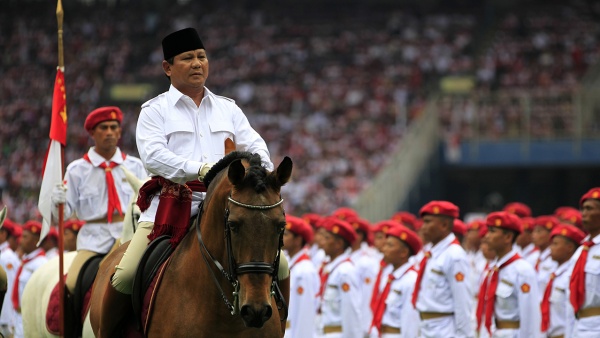Australia/Israel Review
Asia Watch: Rematch looms
May 7, 2018 | Michael Shannon

There is a sense of déjà vu surrounding Indonesia’s coming presidential election, which is now less than a year away – April 17, 2019. Incumbent President Joko Widodo will likely again face off against former army general, son-in-law of Suharto, wealthy businessman and perennial player Prabowo Subianto. Yet the ground has shifted repeatedly since their first presidential bout in 2015, with both political camps enjoying periods of ascendancy.
As things stand now, “Jokowi” is in a strong position, hovering around 70% support in opinion polls and already guaranteed support from most of his ruling coalition, including the second-ranked Golkar Party under new leader Airlangga Hartarto, the current Industry Minister. His popularity can be attributed to his economic policies and partly because he is considered honest and ethical – qualities not found in abundance among the Indonesian political class.
Yet competence, integrity and popularity are not guarantees of electoral success – one need look no further than Jokowi’s one-time protégé, former Jakarta Governor Basuki Tjahaja Purnama. Despite very high popularity ratings, “Ahok”, an ethnic Chinese Christian lost to an opponent backed by Prabowo, whose Islamist supporters railroaded Ahok into jail last year on trumped up blasphemy charges. (A petition to review Ahok’s conviction in light of doctored evidence presented at his trial was rejected by the Supreme Court in March.)
Emboldened by their successful campaign of 2016-17, hard-line Islamists have been exploiting social media to repeatedly accuse the president of being anti-Islam, a closet Christian or even a communist. Angered by the fate of Ahok and facing criticism for being too lax on religious extremism, he banned the infamous Hizb-ut Tahrir Indonesia, enacting a law to outlaw mass organisations deemed to be anti-Pancasila, the philosophical bedrock to a Constitution that guarantees freedom of religion.
The most visible component of this push is the Islamic Defenders Front (FPI), whose thuggish flash mob tactics and extortion rackets have wreaked havoc for two decades, with a wink and a nod from allies in the police, the military and opportunistic politicians. Its firebrand leader Habib Rizieq is currently in exile in Saudi Arabia to avoid various criminal charges including pornography linked to photographs of a mistress, although he is said to be seeking an Islamic coalition to go after Jokowi.
It is likely to once again find a suitor in Prabowo, who, despite no previous association with religious figures, skilfully courted the group to harness its menacing street presence and insidious “fake news” dissemination on social media in the “blasphemy” campaign against Ahok. This continued into the successful campaign to unseat Ahok as Governor of Jakarta, for which Prabowo expressed public gratitude to Rizieq in the aftermath.
Even so, Prabowo has appeared reluctant to formally enter the presidential race, mindful of Jokowi’s popularity and the high cost of mounting a campaign. There was even a flirtation with joining Jokowi’s ticket, but his asking price was reportedly too high.
Prabowo’s Gerindra (Great Indonesian Movement Party) has only one opposition partner, the Sharia-based Justice and Prosperity Party (PKS). Under new election laws, it will require at least one more partner.
Under the 2017 Elections Law, legislative and presidential elections will be held on the same day for the first time, and fielding a presidential candidate will depend on a party or coalition of parties securing 20% of parliament’s seats or 25% of the popular vote, based on the previous (2014) legislative election results.
Gerindra and PKS together scrape through on seats but fall short on the vote threshold with only 18.6%, the National Mandate Party’s (PAN) 49 seats and 7.5% of the vote would secure it on both counts, but in his nomination acceptance speech Prabowo said he would run on one condition. “Even if the party orders me, I need the support of friendly parties.”
It was an uncharacteristic display of humility from Prabowo, even though he entered the event on horseback, to the accompaniment of a marching band and cheering, uniformed Gerindra followers.
And so begins the next round of political horse-trading that will see alliances formed and running mates selected by August 10. While Prabowo’s choice for Vice President will be largely dictated by the requirements of coalition-building, Jokowi’s first criteria will be someone who will be fully accepted by the Muslim community.
This should not be a problem for someone who has just been ranked in the top 20 of this year’s list of the world’s most influential Muslim figures in the annual publication, The Muslim 500. But when Islamist activists can take any off-hand comment, remove all context and distort it into a trigger for outraged accusations of blasphemy, Jokowi cannot rest easy.






